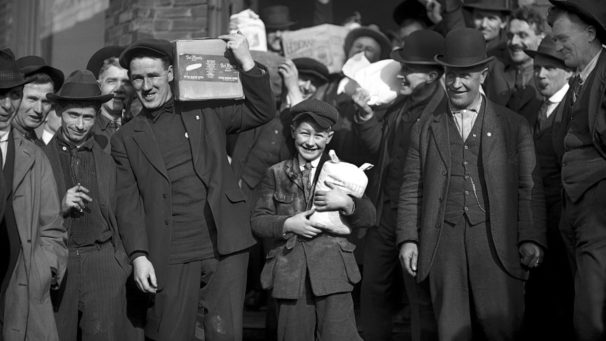
SEATTLE—A capacity crowd greeted with standing ovations a performance by the Seattle Labor Chorus, April 13, of “Labor Will Feed The People,” a musical play that celebrates the centennial of the 1919 Seattle General Strike.
Workers from 100 unions a century ago walked off their jobs in solidarity with striking Seattle and Tacoma shipyard workers, 65,000 in total, idling the city for five days.
The Washington State Labor Council meeting hall was packed as the chorus members sang and spoke their lines, reflecting the fight-back during that shutdown, the most dramatic assertion to date of the unity and power of organized labor in the U.S.
The event was sponsored by Puget Sound Advocates for Retirement Action (PSARA). PSARA Education Fund President Robby Stern told the crowd the labor movement is focused now on winning approval in the State Senate in Olympia of the Long Term Care Trust Act (LTCTA), already approved by the House 63 to 33. If approved by the Senate and signed by Gov. Jay Inslee, it would create the first benefit program to provide long term care anywhere in the U.S.
This was the second performance of the play by Ed Mast in collaboration with the University of Washington Labor Archives. The first was Feb. 6 at the Seattle Museum of History and Industry. It too attracted a capacity crowd.
The play begins with a meeting of the Seattle Central Labor Council (CLC) Jan. 21, 1919, to hear an appeal by the shipyard workers for sympathy strikes. The shipyard workers have been on strike for weeks against the U.S. government’s Emergency Fleet Corporation, the outfit tasked with building ships for the U.S. Navy in preparation for U.S. participation in World War I. The war has been over for three months by this point, however, but a government promise to reopen negotiations to give the workers a desperately needed raise has been broken.
One by one, the unions vote “yes” to join the strike: Electrical Workers, Leather Workers, Hotel Maids, Cooks and Assistants, Teamsters, Ferry Workers, Longshoremen, Waitresses, Women Laundry Workers, Street Car Workers, Typographical Workers.
The play stresses the multi-racial and gender unity forged during the strike. Unionized Japanese-American workers voted to join the strike and stood firm even though threatened with mass deportation. Yet, they had been excluded from the Seattle AFL and barred from the CLC. More than 300 African-American longshoremen joined the strike despite racist segregation that excluded them from many of the unions in the city and nation.

Earl George, an African-American worker, later a leader of the International Longshore and Warehouse Union, joined the strike. His description of the General Strike was quoted in the play, “Nothing moved but the tide.”
The Strike Committee urged workers to stay home—leaving no picket lines or mass rallies as a target for police attack. Culinary workers set up cafeterias—thus the title of the play. Milkmen delivered to milk stations throughout Seattle to feed babies and the infirm. Drug stores were permitted to refill prescriptions.
Mayor Ole Hanson was determined to smash the strike. He added 600 police and deputized further 2,400 goons, authorizing them to arm themselves with rifles and shotguns. Two regiments of federal troops were brought in amid shrieking headlines against “Bolshevism.” The General Strike eventually ended peacefully, but the shipyard strike continued.
As the strike was unfolding, the first “Red Scare” was unleashed nationally, with Attorney General Palmer’s raids rounding up and deporting or imprisoning thousands of workers.
1919 was a year in which strikes swept the nation and the world—at least 3,630 walkouts—including the 1919 “Great Steel Strike” of 365,000 workers led by William Z. Foster and a textile strike in Massachusetts led by Elizabeth Gurley Flynn. The Communist Party, of which the latter two figures would become prominent leaders, was also founded in Chicago in September of that year.
One of the voices from the chorus proclaimed, “We went from having no power at all in the workforce to becoming a power….”
The chorus sang Utah Phillips’s moving anthem, “Ship’s gonna sail to peace and justice. Ship gonna sail, gonna sail someday…” Again, the crowd sang too.
Janet Stecher, director of the Labor Chorus, told People’s World the play will be performed again in Washington, D.C., this summer at the GLAE, the Great Labor Arts Exchange, a gathering of cultural workers from across the country sponsored by the Labor Heritage Foundation.












Comments